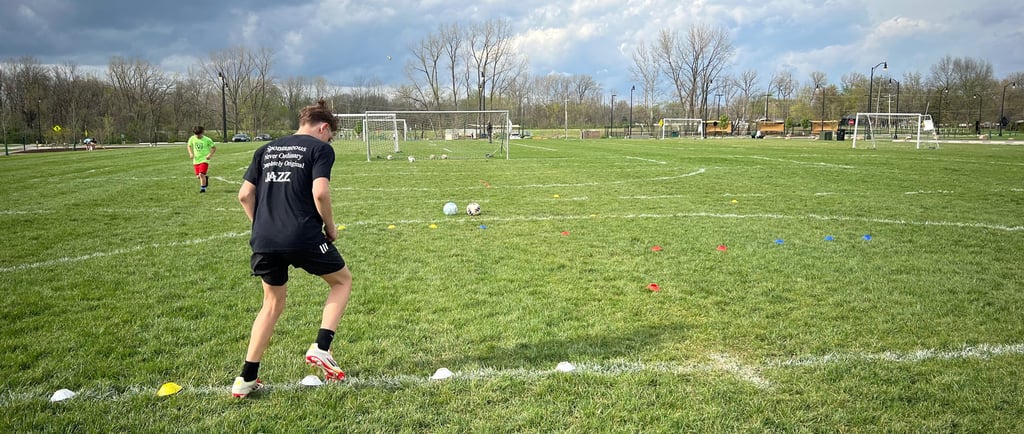Speed vs. Skill: What Matters More for Young Soccer Players?
If you're a parent or coach of a youth soccer player, you've probably asked the question: Is speed more important than skill, or vice versa? Watching elite players like Kylian Mbappé or Lionel Messi may only deepen the confusion. One wins races; the other controls games. So when it comes to development, which should young athletes focus on?
4/22/20254 min read


Speed vs. Skill: What Matters More for Young Soccer Players?
Introduction
If you're a parent or coach of a youth soccer player, you've probably asked the question: Is speed more important than skill, or vice versa? Watching elite players like Kylian Mbappé or Lionel Messi may only deepen the confusion. One wins races; the other controls games. So when it comes to development, which should young athletes focus on?
In this post, we'll break down the roles of soccer speed training and skill development for youth players, explore what the research says, and help you understand what matters most during each stage of a player's growth.
1. Defining Speed and Skill in Soccer
Before we dive in, it’s important to define what we mean:
Speed isn't just about straight-line sprinting. It includes acceleration, deceleration, agility, reaction time, and game-speed decision-making.
Skill includes ball control, dribbling, passing, shooting, and game intelligence.
Both are vital. But the way they impact a player’s development depends on their age, position, and level of play.
2. Why Speed Matters in Modern Soccer
Speed is a huge asset in today’s game. Defenders need to recover quickly, midfielders must transition from defense to attack, and attackers benefit from explosive sprints to get behind the backline.
Benefits of Soccer Speed Training:
Creates separation from defenders
Enhances defensive recovery
Improves pressing and transition play
Boosts confidence and aggressiveness
Increases a player's value to coaches and scouts
Studies show that faster players tend to be more effective in 1v1 situations, and high-speed runs are one of the most impactful actions in goal-scoring opportunities.
3. Why Skill Can’t Be Ignored
Speed might get a player noticed, but skill keeps them in the game.
Skill Development for Youth Players Includes:
First touch
Ball mastery
Vision and decision-making
Passing accuracy
Dribbling under pressure
These skills form the foundation of confidence and creativity. A player who can control the ball in tight spaces or deliver an accurate pass under pressure will always have a place on the field.
4. The Research: Speed vs. Skill in Youth Soccer Development
Research in sports science consistently shows that skill development has a stronger long-term impact in youth stages.
Key Findings:
Technical skill is a better predictor of success in early development than physical attributes.
Young players with high technical ability often outperform more athletic peers in the long run.
Physical traits like speed become more important around ages 13-15 as bodies mature.
In short: focus on skill early, then integrate speed training as players grow.
5. Age-Based Priorities: What to Focus On When
Ages 6-8: Pure Enjoyment and Ball Familiarity
Focus: Skill development through fun, unstructured play. Introduce light coordination and balance work.
Ages 9-12: Technique, Balance & Light Speed Work
Focus: Mastery of the ball. Introduce agility and body control drills. Continue emphasizing creativity.
Ages 13-15: Structured Speed + Advanced Technical Work
Focus: Start structured soccer speed training while continuing high-rep technical work. Add strength and conditioning elements.
Ages 16+: Position-Specific Training
Focus: Combine technical excellence with explosive athleticism. Train based on position: wingers focus on sprints, midfielders on agility and scanning.
6. The Myth of Speed as a Standalone Weapon
A fast player with poor control becomes predictable. Defenders can adjust. Coaches may limit minutes.
Common Pitfalls of Speed-First Players:
Over-reliance on pace
Limited tactical understanding
Ineffective in tight spaces
Coaches want players who can make good decisions quickly—not just run fast.
7. The Power of Skill + Speed
The best players combine both. They control the game and dominate transitions.
Top Examples:
Kylian Mbappé: Blistering speed, lethal finishing, strong technical base
Lionel Messi: Incredible skill, deceptive acceleration, elite decision-making
Erling Haaland: Strength + speed + clean touch + ruthless efficiency
These players spent years developing both assets. And it didn’t happen overnight.
8. How to Train Speed for Youth Soccer Players
Effective soccer speed training isn’t just sprinting with a parachute. It should be specific to the game.
Key Components:
Acceleration drills: 5-15 yard sprints from different positions
Agility ladders and cones: Emphasize quick feet, balance, and reaction
Reaction training: Partner cues, ball drops, reaction lights
Game-speed decision making: 1v1s, rondos, small-sided games
Training 2-3 times a week for 20-30 minutes is plenty for youth players. Keep it engaging.
9. How to Build Skill Without Losing the Fun
Skill training doesn’t have to mean boring reps.
Ideas to Make Technical Work Exciting:
Challenges: How many juggles in 1 minute?
Gamified passing drills: Add goals, timers, or points
Small-sided games: Encourage creativity and decision-making
Compete with siblings or friends
Consistency beats intensity. A few minutes a day with the ball goes a long way.
10. Sample Weekly Plan (Age 11-13 Player)
Monday: Technical training (ball control, passing) - 30 min
Tuesday: Team practice
Wednesday: Soccer speed training (acceleration, agility) - 30 min
Thursday: Team practice
Friday: Small-sided game or private session
Saturday: Match day
Sunday: Light recovery + fun skill challenge
This balance ensures consistent progress while preventing burnout.
11. When to Add Private Training
If your child is showing high motivation or wants to accelerate growth, private sessions can help blend speed and skill development.
Benefits:
Personalized coaching
Real-time feedback
Focused development in specific areas (first touch, shooting, 1v1s, etc.)
Integrates speed training with ball work
At FC Training, we tailor sessions to match your child’s goals and stage of development.
12. What Coaches Really Look For
Speed is eye-catching. But when coaches scout or select teams, they want more than raw pace.
Top Traits Coaches Seek:
Technical control under pressure
Tactical awareness
Ability to impact the game in tight spaces
Mentality: work rate, coachability, confidence
Speed with the ball, not just without
Skill gives players staying power. Speed adds an edge.
Conclusion: Why It’s Not Either/Or
So, speed vs. skill—what matters more? The answer: Both, in the right balance at the right time.
For young players, the foundation should always be skill. Build confidence with the ball. Develop sharp decision-making. Once the basics are locked in, speed training enhances the impact of those skills.
If you want your player to stand out, blend both. Teach them to be explosive and controlled. Fast and creative.
Want to help your player improve both speed and skill in a structured, fun way?
Book a private session with FC Training today and let’s take their development to the next level.
Get in touch
Reach out to book a session or get additional information!


"Coach Thomas has helped my daughter greatly progress at soccer. Before she started private training with him, she didn't have a lot of confidence. She also wanted to improve on her technical abilities as a soccer player. Thomas began working with her and we saw changes almost instantly. He has helped her gain confidence and she has fun during her sessions with him. Her decision-making skills have increased along with her ability to score. We are very thankful for the help and direction we've received from Thomas, it has been vital to our daughter's development as a soccer player."
Sarah C.
★★★★★
